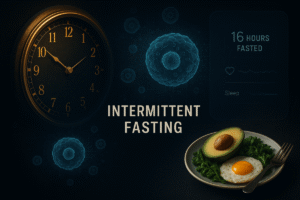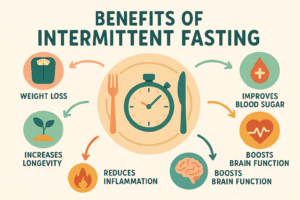Ever catch yourself googling “how to lose weight fast” or “best diet without giving up pizza”? Yeah, we’ve all been there. Diet trends come and go, but intermittent fasting has stuck around — and not just because some influencer said it changed their life. It actually has legit science behind it.
So what is intermittent fasting, why is everyone doing it, and does it really work — especially for women? Buckle up. You’re about to get the no-BS guide that breaks down everything you need to know about intermittent fasting for weight loss, better health, and more energy than your third cup of coffee.
1. What is Intermittent Fasting, Really?

Let’s get one thing straight — intermittent fasting (IF) isn’t a diet. It’s more like a pattern. You don’t count calories, cut carbs, or cry over lettuce. You just eat during specific hours and fast during the rest.
Think of it like this: You’re either in “eating mode” or “chilling mode.” And your body uses that “chill time” (aka fasting window) to do some deep cleaning, repair, and even fat-burning magic.
And yep, it’s that simple.
2. Different Types of Intermittent Fasting Schedules
You’ve got a few options when it comes to picking an intermittent fasting plan. Here’s a breakdown of the most popular ones:
| Fasting Schedule | Eating Window | Best For |
|---|---|---|
| 16:8 | 8 hours | Beginners, daily routine |
| 18:6 | 6 hours | Intermediate, fat loss focus |
| 20:4 (Warrior Diet) | 4 hours | Advanced fasters |
| OMAD (One Meal a Day) | 1-2 hours | Super strict folks |
| 5:2 Method | Eat normally 5 days, low-cal 2 days | People who want flexibility |
| Alternate-Day Fasting | Fast every other day | People with strong willpower |
3. Benefits of Intermittent Fasting (Beyond Just Weight Loss)

Let’s be real — most people start IF for one reason: to drop some pounds. But here’s the kicker — the benefits of intermittent fasting go waaay deeper than just shrinking your waistline.
Main Health Benefits of Intermittent Fasting
1. Weight Loss (Yep, It Works)
When you’re not constantly snacking, your body starts burning fat for energy. IF helps you create a calorie deficit without feeling like you’re starving 24/7.
2. Boosts Metabolism
Fasting triggers hormones like norepinephrine and growth hormone that kick fat-burning into high gear.
3. Improves Insulin Sensitivity
According to studies, IF lowers insulin resistance, helping regulate blood sugar and possibly preventing type 2 diabetes.
Cite: Harvard Health, 2018
4. Brain Gains
Yup. Fasting supports brain health by reducing oxidative stress and increasing BDNF (a brain-boosting hormone).
Cite: National Institute on Aging, 2022
5. Reduces Inflammation
IF can lower markers of inflammation — which is huge because inflammation is linked to like… everything bad (heart disease, cancer, you name it).
6. May Extend Lifespan
Animal studies show fasting can help you live longer. More human research is needed, but the early data is super promising.
4. Unique Benefits of Intermittent Fasting for Women
Ladies, listen up — your body’s hormonal setup is different, and that matters.
Key Benefits of Intermittent Fasting for Women
-
Hormone Regulation: When done right (not too extreme), fasting may help balance estrogen and progesterone.
-
Reduced PMS Symptoms: Some women report less bloating and better moods.
-
Supports Fertility: Shorter fasts (like 14:10) have shown to be safer and more effective for women looking to keep their cycles regular.
But heads up — women are more sensitive to calorie restriction. If you go too hard too fast, it can mess with your cycle, sleep, or energy. So ease into it, ok?
5. Common Intermittent Fasting Mistakes You Gotta Avoid

Before you dive in and skip breakfast tomorrow, don’t make these rookie mistakes:
-
Not Drinking Enough Water: Hydration is everything during fasting.
-
Going Zero Calories: You can still have black coffee, tea, and even some low-cal drinks.
-
Eating Junk in Your Eating Window: It’s not a free-for-all. You still need whole foods, not just pizza and ice cream.
-
Skipping Sleep: IF works best when your sleep game is strong.
-
Not Listening to Your Body: Hunger is okay. Feeling faint or tired all day? That’s a no-go.
6. Sample Intermittent Fasting Schedule
Here’s a realistic 16:8 intermittent fasting schedule that won’t make you hate life:
| Time | What’s Happening |
|---|---|
| 7 AM | Wake up. Drink water + black coffee |
| 8–11 AM | Fast continues. Stay busy |
| 12 PM | First meal (high-protein lunch) |
| 3 PM | Snack (fruit, nuts, or Greek yogurt) |
| 7:30 PM | Dinner (lean meat, veggies, maybe some rice) |
| 8 PM | Fasting starts again |
Boom. Rinse and repeat.
7. Frequently Asked Questions (FAQ)
Q: Can you drink coffee during intermittent fasting?
A: Heck yeah. Black coffee, tea, and water are your best friends. Just skip the sugar and creamer.
Q: How long before you see results with intermittent fasting?
A: Most people start feeling better within a week. Weight loss? You’ll notice changes in 2-4 weeks if you’re consistent.
Q: Is intermittent fasting safe for everyone?
A: Not really. If you’re pregnant, breastfeeding, underweight, or have a medical condition, talk to your doc first.
Q: Do you have to do it every day?
A: Nope. Some folks fast just a few times a week. Find what works for you.
8. Conclusion: Is Intermittent Fasting Worth Trying?
If you’re tired of fad diets that leave you hangry and bloated — intermittent fasting might be your golden ticket. It’s flexible, science-backed, and doesn’t require you to give up your favorite foods. Just eat during your window, fast the rest, and let your body do its thing.
Whether you’re aiming for weight loss, better brain health, more energy, or just a fresh routine, the benefits of intermittent fasting are seriously impressive — especially when you go slow, stay hydrated, and listen to your body.
So go ahead — give it a shot. Worst case? You skip breakfast for a few days. Best case? You find a lifestyle that actually sticks.
And if you’re still wondering, “Is it for me?”… try it for a week and see how your body responds. No magic pill, just better habits.
Sources & Citations
-
Harvard Health, 2018: Intermittent Fasting: Surprising Update
-
National Institute on Aging, 2022: Study Shows Health Benefits of Intermittent Fasting
-
Johns Hopkins Medicine, 2023: Intermittent Fasting: What is it, and how does it work?
-
Mayo Clinic, 2024: Is Intermittent Fasting Right for You?
